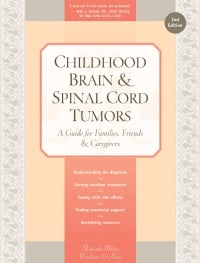Childhood Brain and Spinal Cord Tumors
Dental problems
Both cranial radiation and chemotherapy can cause changes in the mouth, teeth, and ability to salivate. Awareness of the potential problems, coupled with good preventive care, can help maintain oral health during treatment. Ask your dentist to refer to the current issue of the Pediatric Dentistry Reference Manual to formulate a dental plan.
During treatment, plaque can build up rapidly on your child’s teeth, increasing the likelihood of cavities and gum infections. Take your child to the dentist for a cleaning and check-up every 3 to 4 months, as long as her blood counts are high (an ANC of more than 1,000 and platelets of more than 100,000). Children with a central venous catheter should be given antibiotics before and after each visit to the dentist.
When Kevin (diagnosed with posterior fossa ependymoma) turned 2, I asked our oncologists if they thought he should see a dentist, that I was worried about his teeth. They tried to take a peek at his teeth, but Kevin was like Fort Knox. They both said that he shouldn’t have any problems because of his illness and that we could bring him to our regular dentist when he turned 3. When Kevin was a little over 2 ½, I suspected that he had a few cavities. I brought him to a local pediatric dentist. After a horrible exam of three people holding him down, the dentist said he had four cavities. He wanted to fill them all without putting Kevin under anesthesia.
After talking to our pediatrician, she said, “Why don’t you go to a Children’s Hospital dentist?” So we did, and the exam was much better. Anyway, they thought he had more than four cavities and that two of his teeth would have to be removed. They wouldn’t know for sure until they did an x-ray during surgery. He was put under for his surgery and they removed two teeth and filled five cavities. We were told that the cavities were probably due to radiation. He also had a right paralyzed vocal cord and right facial paralysis. He always chewed his food on the left side of his mouth. But the cavities were on both sides. And he hated to have his teeth brushed! After his cavities were filled, the Children’s dentist wanted to see him every 3 months for a cleaning and checkup.
Ask your child’s oncologist and dentist for advice about tooth care when counts are very low. Often parents are advised to use a sponge or damp gauze to gently wipe off their child’s teeth after meals instead of brushing.
My daughter had problems with thick yellow saliva during the entire time she was treated. It coated her teeth and formed a lot of plaque. I brought her to an excellent pediatric dentist every 3 months to have the plaque removed. She took antibiotics half an hour before treatment and then again 6 hours afterward. He also put sealants on all of her molars and, even though there were many weeks when her teeth could not be brushed, she never got a cavity.
Some parents report delays in the arrival of their child’s permanent teeth. Children who receive chemotherapy or cranial radiation therapy may also have poorly developed or absent permanent teeth and blunted tooth roots.
Table of Contents
All Guides- Introduction
- 1. Diagnosis
- 2. The Brain and Spinal Cord
- 3. Types of Tumors
- 4. Telling Your Child and Others
- 5. Choosing a Treatment
- 6. Coping with Procedures
- 7. Forming a Partnership with the Treatment Team
- 8. Hospitalization
- 9. Venous Catheters
- 10. Surgery
- 11. Chemotherapy
- 12. Common Side Effects of Chemotherapy
- 13. Radiation Therapy
- 14. Peripheral Blood Stem Cell Transplantation
- 15. Siblings
- 16. Family and Friends
- 17. Communication and Behavior
- 18. School
- 19. Sources of Support
- 20. Nutrition
- 21. Medical and Financial Record-keeping
- 22. End of Treatment and Beyond
- 23. Recurrence
- 24. Death and Bereavement
- 25. Looking Forward
- Appendix A. Blood Tests and What They Mean
- Appendix C. Books and Websites

